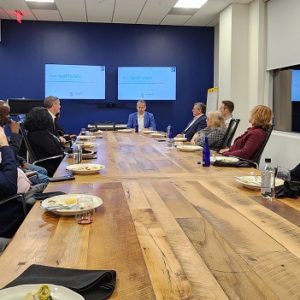Artificial Intelligence-Aided Care Could Help Slow the Progression of Alzheimer’s, Chitra Dorai Tells NJIT Murray Center Audience
According to the Alzheimer’s Association, 5.8 million Americans are living with Alzheimer’s, and that number is expected to rise to 14 million by 2050. Every 65 seconds, someone in the United States is diagnosed with the disease. As for the help given to older adults in the U.S,. 83 percent comes from family members, friends or other unpaid caregivers. These caregivers have provided 18.5 billion hours of care, valued at nearly $234 billion.
These statistics caught the attention of Chitra Dorai, a computer scientist and artificial intelligence (AI) expert who recently ended a 21-year-long career at IBM. By the time she left, she was an IBM Fellow (the first Indian woman to be so appointed) and CTO for AI, Cognitive Solutions and Services, in IBM’s Global Business Services unit. She quit IBM to start her own company, Amicus Brain (New York), which applies her extensive AI knowledge and experience to the nonclinical care of Alzheimer’s patients. For decades, Dorai had been envisioning how AI could be equipped to take care of people. So, for her, Amicus Brain was a natural next step after her career at IBM. Dorai shared her experiences and views about the possibilities of AI at the 2019 Women Designing the Future – Game Changers! conference, held on March 29 at NJIT’s Murray Center for Women in Technology. Dorai’s talk highlighted some of the big questions about AI and described the path that led her to founding Amicus Brain.
Dorai has spent 30 years researching AI. “I have seen what AI can be,” she said. “I have also seen its phases. But this time it’s real.”
Even though AI is now a reality, Dorai knows that many people fear the technology. “There is a lot of misperception in terms of use,” she said. “There’s one school presenting a dystopian view of the world and another one which is probably naively optimistic in terms of AI being the magic to solve all the problems. I think my belief is that there is a middle ground, as long as all of the scientists, especially, are very deliberate in the way we are moving the technology.”
Dorai’s work at IBM provides several examples of how AI, instead of being something to fear, is something that can be used to benefit society. “I always want to bring what technology can do to the real life of the people.”
One example she shared was her work during the 2008 financial crisis, when she used AI, machine learning, text analytics and speech-recognition algorithms to build a decision support system for loan officers, to help them find the right solutions for delinquent loans. “I built a number of solutions with my team and, within less than three years, we saved thousands and thousands of U.S. homeowners from foreclosure.”
Dorai’s solution for loan officers extracted both quantitative and qualitative (or emotional) data. Through analyses of phone calls, loan officers could distinguish between people who were in danger of losing their only place of residence and those who were defaulting on loans for a second home. “You could not find [this information] in any quantitative data, but this emotion can be most of the story,” she said.
Dorai is hoping that her company will overcome some of the fears that people have about AI. Amicus Brain is building humane AI solutions to improve the quality of life for both patients and caregivers, thereby reducing the risk of burnout for the caregivers and improving the sense of well-being for the patients. She selected the name “Amicus Brain” for the company so that the product could be perceived as the friendly companion to dementia and Alzheimer’s patients that she envisions.
The Amicus Brain bot is similar to Alexa, but with a twist. Instead of the patients asking the bot questions, the bot will be asking the patient questions. “The bot needs to be engaging the patients to make them talk, so that they are not feeling isolated, they are not keeping quiet,” said Dorai. By having a bot that will help keep Alzheimer’s patients mentally active, she hopes to “bend” the progression of the disease nonclinically. “We have an AI system that can be a companion, stimulating the brain by doing whatever [the patient is] interested in doing, [whether it be] talking, engaging, playing music et cetera,” she said.
“Even if [the caretaker has] so much love [for the patient], I have seen the caretaker snap because it’s 50 times being asked the same question because [the patient is] forgetful,” Dorai continued. “So, that’s when AI can step in and provide continuous care.”
The Amicus Brain vision is for responsible, accountable and transparent AI. As a nonclinical solution for the care of Alzheimer’s patients, it could very well help slow the progression of the disease and put a dent in the enormous number of hours caregivers are contributing to handling the Alzheimer’s epidemic.

